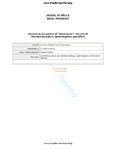Dissecting the politics of “Obamacare”: The role of distributive justice, deservingness, and affect.
| dc.contributor.author | Hanoch, Y | |
| dc.contributor.author | Choma, B | |
| dc.contributor.author | Barnes, A | |
| dc.contributor.author | Braun, R | |
| dc.date.accessioned | 2018-10-01T09:21:41Z | |
| dc.date.issued | 2018-11 | |
| dc.identifier.issn | 0021-9029 | |
| dc.identifier.issn | 1559-1816 | |
| dc.identifier.uri | http://hdl.handle.net/10026.1/12436 | |
| dc.description.abstract |
Political conservatives (vs. liberals) are commonly thought to oppose government-based policies that promote equal distribution of resources, preferring that resources be distributed based on merit. In a sample of American adults (n = 436), distributive fairness perceptions, deservingness, and affective reactions related to the Affordable Care Act (ACA) were examined to better understand the ideological differences in ACA attitudes. Participants completed measures of political orientation, ACA knowledge and attitudes, deservingness, distributive justice principles (i.e., need, equality, merit), anger, and sympathy. Identifying as politically liberal (vs. conservative) and greater knowledge on the ACA predicted greater ACA support. Preferences for the distributive justice principles of equality and need (but not equity) mediated the relation between political orientation and ACA attitudes. Further, conservatives perceived less deservingness and in turn experienced greater anger and opposition to the ACA. Additional exploratory analyses also suggest that the positive path between deservingness and ACA support is moderated by political orientation such that it is stronger among political liberals than conservatives. Implications of the ideological chasm in relation to the ACA are considered. | |
| dc.format.extent | 634-642 | |
| dc.language | en | |
| dc.language.iso | en | |
| dc.publisher | Wiley | |
| dc.subject | 5205 Social and Personality Psychology | |
| dc.subject | 52 Psychology | |
| dc.subject | Clinical Research | |
| dc.subject | 16 Peace, Justice and Strong Institutions | |
| dc.title | Dissecting the politics of “Obamacare”: The role of distributive justice, deservingness, and affect. | |
| dc.type | journal-article | |
| dc.type | Article | |
| plymouth.issue | 11 | |
| plymouth.volume | 48 | |
| plymouth.publication-status | Published | |
| plymouth.journal | Journal of Applied Social Psychology | |
| dc.identifier.doi | 10.1111/jasp.12553 | |
| plymouth.organisational-group | /Plymouth | |
| plymouth.organisational-group | /Plymouth/REF 2021 Researchers by UoA | |
| plymouth.organisational-group | /Plymouth/REF 2021 Researchers by UoA/UoA04 Psychology, Psychiatry and Neuroscience | |
| plymouth.organisational-group | /Plymouth/Research Groups | |
| plymouth.organisational-group | /Plymouth/Research Groups/Centre for Brain, Cognition and Behaviour (CBCB) | |
| plymouth.organisational-group | /Plymouth/Research Groups/Centre for Brain, Cognition and Behaviour (CBCB)/Behaviour | |
| dcterms.dateAccepted | 2018-07-10 | |
| dc.rights.embargodate | 2019-10-5 | |
| dc.identifier.eissn | 1559-1816 | |
| dc.rights.embargoperiod | Not known | |
| rioxxterms.versionofrecord | 10.1111/jasp.12553 | |
| rioxxterms.licenseref.uri | http://www.rioxx.net/licenses/all-rights-reserved | |
| rioxxterms.licenseref.startdate | 2018-11 | |
| rioxxterms.type | Journal Article/Review |


